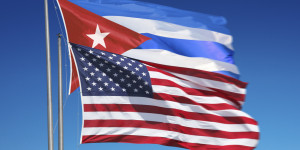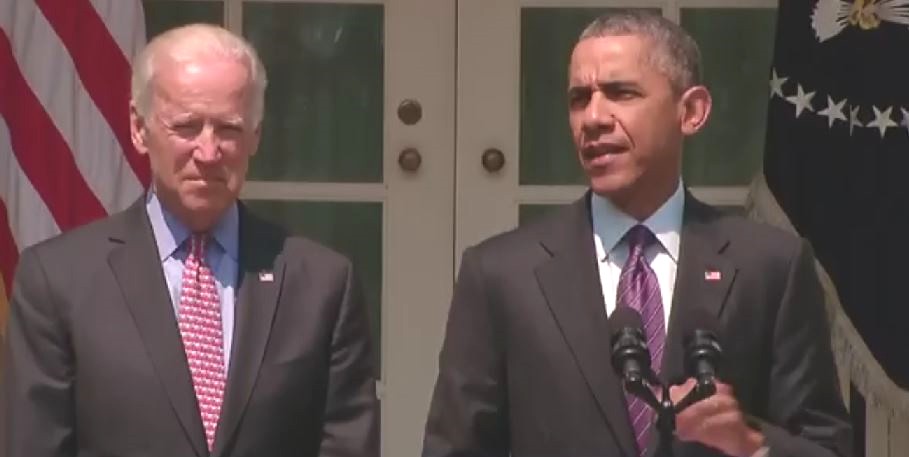
Havana, Washington set embassy openings for July 20
Presidents Obama and Raúl Castro on Wednesday announced that embassies in Washington and Havana will reopen on July 20.
Obama made the announcement from the White House Rose Garden, Vice President Biden (in photo above) by his side; Castro made it in the form of a letter confirming Obama’s words, which was published in the official Cuban media. (Click here for an English translation of the letter.)
Secretary of State John Kerry is expected to visit Havana when that ceremony is held.
“This is a historic step forward in our efforts to normalize relations with the Cuban government and people. We’ll begin a new chapter with our neighbors in the Americas,” Obama said.
“There have been very real, profound differences between our governments and sometimes we have allowed ourselves to be trapped by a certain way of doing things,” the President said.
“The United States had been clinging to a policy that wasn’t working. Instead of supporting democracy and offering an opportunity to the Cuban people, our efforts to isolate Cuba, despite good intentions, increasingly had the opposite effect, cementing the status quo and isolating the United States from our neighbors in this hemisphere.
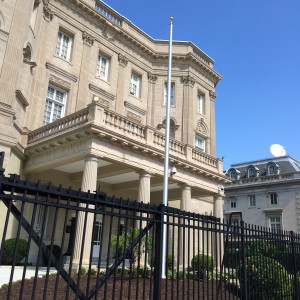
“The progress that we mark today is yet another demonstration that we don’t have to be imprisoned by the past. When something isn’t working, we can and will change.
“Later this summer, Secretary Kerry will travel to Havana, formally, to proudly raise the American flag over our embassy once more.
This is not merely symbolic. With this change, we will be able to substantially increase our contacts with the Cuban people, will have more personnel at our embassy, and our diplomats will have the ability to engage more broadly across the island. That will include the Cuban government, civil society, and ordinary Cubans who are reaching for a better life. […]
“And I’ve made it clear that we will also continue to have some very serious differences that will include America’s enduring support for universal values, like freedom of speech and assembly, and the ability to seek out information. And we won’t hesitate to speak out when we see actions that contradict those values.”
Alluding to critics of his decision, Obama said that, “Yes, there are those who want to turn back the clock and double down on a policy of isolation […] but that has not worked for the past 50 years. Nobody expects Cuba to transform overnight. But American engagement […] is the best way to advance our interests and support democracy and human rights.”
Formal relations between the two countries were severed in 1961, during the administration of Dwight D. Eisenhower.
No indication has been made in either capital as to what functionaries would be appointed as ambassadors of their respective governments. The current chiefs of the interests sections, Jeffrey DeLaurentis and José Ramón Cabañas Rodríguez, could serve as interim ambassadors.
In a statement published Wednesday in the daily Granma, the Revolutionary Government cited certain conditions for normalization of relations.
“There can be no normal relations between Cuba and the United States while the rigorously applied economic, commercial and financial blockade continues,” the statement said.
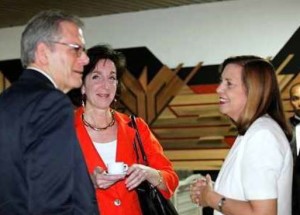
“To achieve normalization, it will also be essential that the territory illegally occupied by the [U.S.] Naval Base in Guantánamo be returned, that the radio and television transmissions to Cuba that violate international norms and are harmful to our sovereignty policies be terminated, that programs aimed at promoting internal subversion and destabilization be eliminated, and that the Cuban people be compensated for the human and economic damages caused by the policies of the United States.”
[The full text of that statement, translated into English by Progreso Weekly, can be read by clicking here.]
Obama and Castro announced the plan to resume relations on Dec. 17, 2014, after months of secret negotiations. Both met face to face in Panama in April during the Summit of the Americas and shook hands cordially.
“We are willing to discuss everything, but we need to be patient, very patient,” Castro reportedly said at the time.
Negotiators for both countries have met four times to iron out details of an accord. De Laurentis has been present at all the meetings, which have been led by Assistant Secretary of State Roberta Jacobson for the United States and Josefina Vidal, head of the Foreign Ministry’s North American desk, for Cuba.
Brazilian President Dilma Rousseff, currently visiting Washington, referred to the historic decision at a White House press conference Tuesday evening.
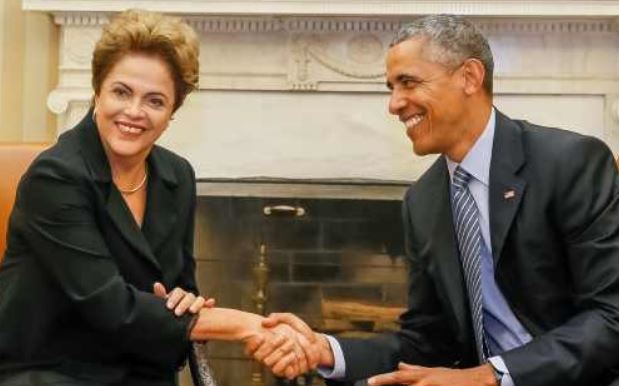
“In conclusion,” she said, “may I refer to the importance for Latin America of the recent decision made by President Obama and by President Raúl Castro, even with the partnership with Pope Francis, to the effect of opening up relations with — or resuming relations with — Cuba, a very decisive milestone and point in time in U.S. relations with Latin America. It is really about putting an end to the lingering vestiges of the Cold War. And it ultimately elevates the level of the relations between the U.S. and the entire region.
“May I acknowledge the importance of that gesture to all of Latin America and also to world peace at large. It is an important example of relations to be followed.”
In Beijing on Wednesday, a Foreign Ministry spokeswoman said that his nation “welcomes and supports” the new developments. “The resumption of Cuba-U.S. diplomatic ties is conducive to the common interests of the two countries and their people,” said Hua Chunying.
“China hopes the U.S. will lift its blockade and sanctions against Cuba as soon as possible and develop normal relations with Cuba on the basis of mutual respect, equality and mutual benefit,” she added.
Sarah Stephens, executive director of the Center for Democracy in the Americas, called it “a moment we have been working toward for many years. The restoration of diplomatic relations between our countries is a major achievement that will help to heal decades of mistrust and will open opportunities for the U.S. and Cuba to collaborate on issues of mutual interest like immigration, environmental conservation, and regional trade.
“We applaud the tireless work of Cuban and U.S. diplomats, policymakers, academics, and activists who have helped make this possible,” Stephens continued. “We are ready to work with all our allies to defend these positive steps initiated by President Obama and to move forward with removing the embargo once and for all.”


